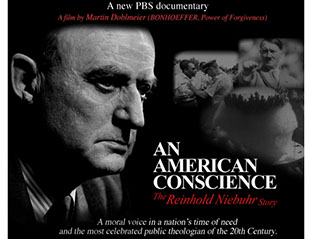Reinhold Niebuhr is considered one of the towering theologians and public intellectuals of the 20th century. His books are still widely read, he is frequently quoted, he has often served as an important point of reference for leaders of all sorts (including many recent U.S. presidents)—and most recently he has become the subject of a newly released film, An American Conscience: The Reinhold Niebuhr Story.
Niebuhr’s Relevance for Today
Niebuhr remains relevant for a 21st century American and international context that is increasingly assertive in its diversities and aggressive in its divisions. Two dimensions of his leadership stand out in particular: his intellectual emphasis on moral approximation (rather than rigid dogmas) as both ends and means for public square participation and leadership; and his pastoral engagement on matters bearing upon severe economic inequalities (as experienced in his early 20th century Detroit pastorate).
More than one recent president has cited Niebuhr’s influence, particularly Niebuhr’s reinforcement of the idea that “politics is the art of compromise.” Most recently, Barack Obama’s presidency strongly embraced core tenets of Niebuhr’s realism about the political importance of policy approaches guided by approximate goals rather than absolutist objectives, and about the willingness to take required actions (even when inconsistent with deeper purposes and preferences) in pursuit of those goals.
Compromise in Politics
For Niebuhr, compromise was not something pursued simply for the sake of compromise or merely as a strategy for achieving or retaining positions of leadership. Compromise was a means for achieving a common good. Moreover, Niebuhr understood that in politics and public affairs you rarely get everything you want, and in order to set some of what you want and to lead on behalf of all of the people you may have to swallow some things you find unpleasant. Within the current American context of political polarization and zero-sum decision making, Niebuhr’s theological and political inclinations in the direction of broader, more consensual leadership are quite instructive.
Niebuhr was troubled by the ideological impasses of his day, but he was also concerned about the growing economic inequalities within his context and the systematic denials and obfuscations relating to causes and consequences of those inequalities.
Niebuhr as Pastor
Niebuhr served as pastor of a congregation in Detroit from 1915 to 1928, at a time when the auto industry’s influence was far-reaching. In Niebuhr’s public theological praxis during his Detroit pastorate as explicitly outlined in an unpublished essay on Detroit written about the same time, Niebuhr challenged social imbalances of power and divergences of perspective between “aristocratic” auto industry executives and Detroit’s laboring classes. He juxtaposed the political, economic, and moral self-certainties of auto industry movers and shakers with the day-to-day uncertainties and increasing misgivings of underpaid semi-skilled laborers.
Niebuhr objected to the indifference demonstrated toward the struggles of workers by persons in the power structure and by community constituencies actively or passively aligned with persons in power (including clergy) and made clear in his unpublished essay and in his public leadership within Detroit that an appropriate response to these community-threatening dichotomizations and imbalances was unionism. For Niebuhr, unionism was the best available strategy at the time and deserved broad support among community leaders entrusted with community interests. He applauded the handful of clergy leaders in Detroit who supported unionization, even in the face of the Detroit power structure’s systematic capacity for reprisal against pro-union community leaders, and he strongly criticized clergy “who talked endlessly about love and brotherhood but [whose] preachments had little relevance to the problems . . . of adjudicating interests and balancing power.”
Niebuhr addressed similar concerns in a published collection of reflections on his Detroit pastorate, entitled Leaves from the Notebook of a Tamed Cynic. In Leaves, Niebuhr assails the social inequalities, economic disparities, and racism evident within the Detroit context, he rejects prevailing rationalizations of Detroit’s growing inequalities as inevitable and acceptable costs of economic progress, and he challenges church conformity to these rationales and the failure of church leaders to draw connections between the spiritual and social aspects of their faith.
In these various Detroit reflections and involvements, Niebuhr’s intersecting theological and sociological positioning allowed him to bring into view essential contradictions between economically-defined panaceas of human fulfillment and the realities of social disparity and inequality characteristic of industrializing Detroit—while also disabusing the church sector of notions of neutrality on these issues. Given the enormous economic inequalities within our current national and global context, Niebuhr is instructive here as well.
Niebuhr Documentary: An American Conscience
A film reminding us of Niebuhr’s important contributions and extending his voice to a viewership perhaps as wide or wider than his readership is indeed a valuable contribution. Join Pittsburgh Theological Seminary Fri., Feb. 17, 2017, from 7:00-9:30 p.m. for a special screening of the new PBS documentary film An American Conscience: The Reinhold Niebuhr Story. The movie details the life and influence of Niebuhr as a 20th-century American Protestant theologian, ethicist, and commentator on politics and public affairs. Following the film will be a panel discussion with community leaders reflecting on the relevance of Niebuhr’s work to current issues. Panelists include: Dana Gold, chief operating officer, Jewish Family and Children’s Service of Pittsburgh; Tony Norman, journalist, Pittsburgh Post-Gazette; Dave Swanson, pastor, Pittsburgh Mennonite Church; and John Welch, vice president for student services and community engagement and dean of students, Pittsburgh Theological Seminary.
The Rev. Dr. R. Drew Smith serves Pittsburgh Theological Seminary as professor urban ministry. He’s also involved in the work of the Seminary’s Metro-Urban Institute which combines the theory and practice of collaborative community ministry into a program of urban theological education. Both a political scientist and a clergyman, he has initiated and directed a number of projects related to religion and public life which have collected research data on political involvements, community development activities, and outreach ministries of churches, especially African-American churches.

